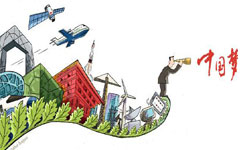Strength of resonance between Africa, China
By Bob Wekesa (China Daily) Updated: 2014-05-05 08:19The Chinese Dream put forth by President Xi Jinping has captured the hearts and minds of people in China, and to a large extent in Africa. The fervor to embrace the Chinese Dream is understandable, as it seeks to provide a life of prosperity for people in which they can become whatever they choose to be.
The Chinese Dream is perhaps the most relevant in Africa as it seeks new ways to empower people after several years of socio-economic underdevelopment. It is also interesting to note that the Chinese Dream seeks to build on the achievements of the earlier generations of Chinese leaders. There is also a historical trajectory on the implications of the Chinese Dream on the African continent.
 |
 |
One perspective that history has recorded is that China contributed to the liberation struggle in several African countries in the understanding that both regions had undergone more or less similar experiences under variants of European colonialism and imperialism. Thus the antecedents of the Chinese Dream and what it portends for Africa - as natural global south allies - should be traced to the 1950s through to 1990 when the last African country - South Africa - was liberated.
Deng Xiaoping's well-known dictum of a "good cat being the one that catches mice regardless of whether it's black or white" aptly captured China's experimentation with sweeping reforms. Dubbed socialism with Chinese characteristics, the market-oriented theories and policies lifted millions of Chinese people from poverty and put the world's most populous nation on course to be a global economic giant. Unfortunately the period when the Chinese people were achieving their economic aspiration is also the period when most, if not all, African countries were facing huge economic challenges arising out of the failed so-called Washington Consensus policies.
Thus, while the ground was being forged throughout the 1980s and 1990s for the Chinese Dream to gain traction in the second decade of the 21st century, African people were facing the nightmares of civil wars and economic underdevelopment.
- Baosteel, Aurizon offer $1b for Aquila Resources
- New nuclear generating unit operational in East China
- China's manufacturing weakens, but at slower pace
- Profitability of China's listed firms rebounds in 2013
- China factory activity shrinks in April
- China's first mobile virtual operator launches business
- India's smarter-shopping Phenom
- China cartoon festival see $2.2b transaction







